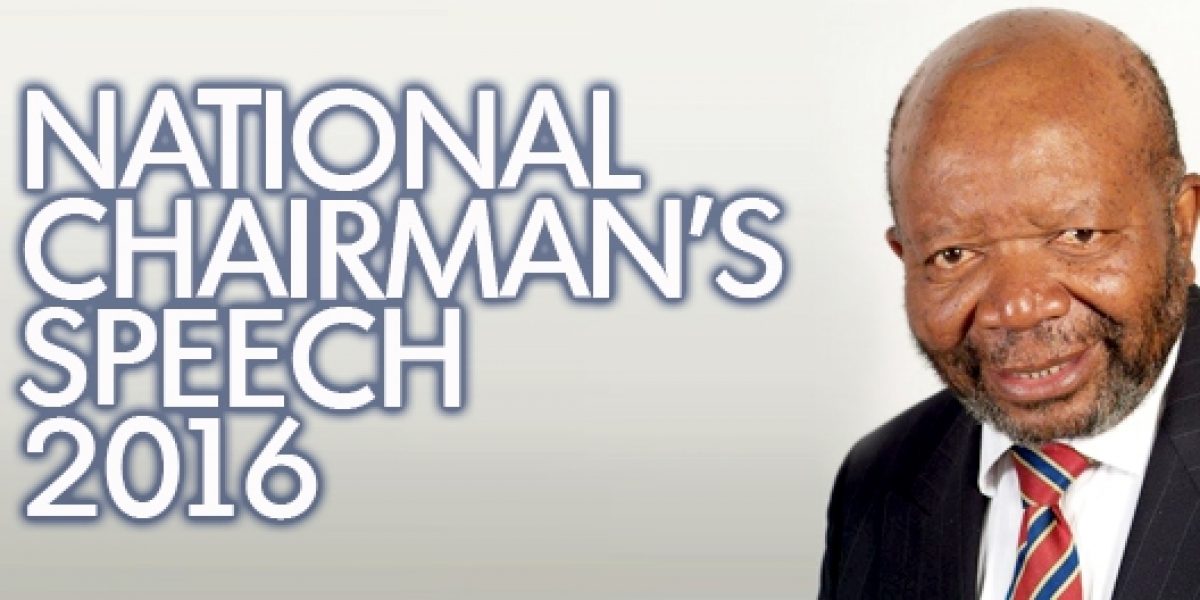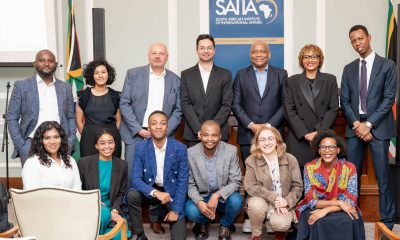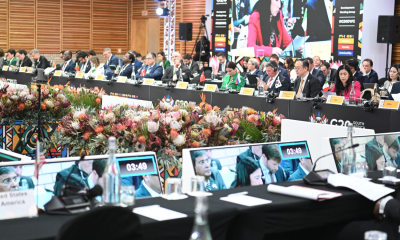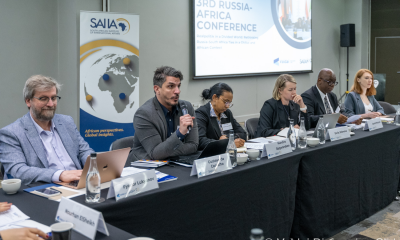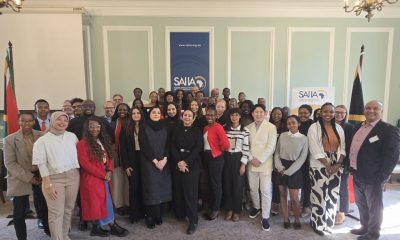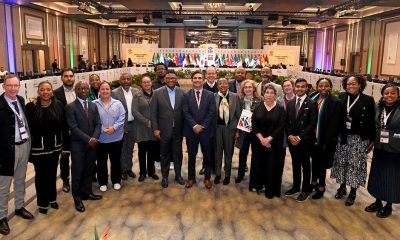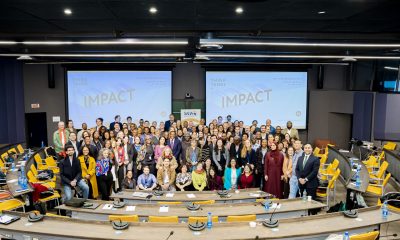This year, 2016, marks 20 years since the adoption of the post-apartheid, democratic constitution by the South African parliament. Its adoption was ushered in by a rousing speech of then deputy president Thabo Mbeki. His speech had an ecumenical message. It embraced all the peoples of South Africa in its moving definition of ‘I am an African’, and equally reminded us of our common humanity and the better angels of our nature that moved us to overcome human foibles and rise to construct a constitution that recognized the individual dignity of all human beings.
Of course the constitution could not by its simple adoption eradicate 300 years of oppression of our fellow man and women. No less could it wipe out poverty and societal injustices overnight. But it did lay the foundation of a new democratic state, based on the rule of law, where the dignity of the individual is respected, where arbitrary decisions are no more, and where a path can be carved to create citizens with self-esteem, and respect for others and their differences. After all, our motto !ke e: /xarra //ke means ‘diverse people unite’.
How far we have come since then! In many ways we can be proud of our achievements, both domestically and through our active international engagement. But our more recent efforts have been characterized by complacency, discordance and even arrogance.
Corruption and elite capture of the state have seeped into the body politic. Institutional actions to hold actors accountable are berated and belittled for revealing a hidden political, racist, factionalist agenda, rather than asserting constitutionalism. Chronic unemployment and an education sector still mired in mediocrity condemn our youth to a life of no tomorrow. Racism, already simmering under the surface, becomes the easy vent; demagoguery, the refuge of the rash; and xenophobia, the language of the marginalized. This is what the public conversation has descended to.
We have entered the winter of our discontent. Our president conceded at the State of the Nation address on 11 February that South Africa was unlikely to realize the growth target of 5% by 2018. Our growth in 2016 is projected to be less that 1%, while citizens take to the streets regularly to protest against poor public service delivery and the use of public funding for personal enrichment at all levels of government. Without a doubt, the #FeesMustFall campaign last year, itself a consequence of difficult economic times, does not only attest to legitimate demands for affordable higher education for our youth, but also lays bare the absence of social cohesion and the disconnect between governors and the governed.
The constitutional compact of the last 20 years seems dull and rudderless today. We are responding to our baser instincts. We ignore at our peril that the ‘dignity of the individual cannot be separated from one’s material well-being’. But equally, sustainable solutions to this problem do not lie in populist initiatives, which earn votes today but condemn us to penury later. Unfortunately, the path we have travelled in the recent past provides fertile ground for the rise of populism. True leadership lies in making the hard calls (especially during an election year), not deferring to interminable commissions or resorting to populism that divides society rather than uniting it.
This domestic political and economic turmoil also undermines South Africa’s leadership voice in Africa and on the world stage. South Africa’s historical bridge building role is more necessary now than ever in a world defined increasingly by disorder. So too is the normative leadership that it displayed in the early years of our constitutional democracy. But we are found lacking and we have lost the moral high ground, a point made by the National Development Plan, much as we hate to admit it. The position that we are adopting on the International Criminal Court erodes years of progress on the very real political challenges of our time – reducing the impunity of leaders.
Across the world examples abound of the consequences of leaders’ impunity. Since 2011, the Levant, once a source of economic dynamism and religious tolerance, is disfigured by untold violence. From neighbouring Turkey to the fairly insulated doors of the European Union, the effects of that conflict are palpable in refugee and illegal migration flows, including the export of ghastly terrorism – of the sort that we witnessed at the Bataclan in Paris in November last year. The solidarity with which refugees were received several months ago, has quickly morphed into hostility, hardening in some instances domestic anti-immigrant rhetoric and xenophobia in the receiving states.
Africa has not been immune to this form of violent religious extremism, with the ‘soldiers of Allah’, Al Shabab, Boko Haram and Al Qaeda in the Islamic Maghreb having pledged allegiance to the violence of the Islamic State in Syria (ISIS) or Al Qaeda. Their mode of terror and violence has led to the death and displacement of tens of thousands of civilians in West, Central and East Africa. Moreover, various African countries, South Sudan, Somalia, the Central African Republic, Burundi and the Central African Republic continue struggling to extract themselves from older forms of conflict and perpetual crisis.
In 2016, these dark events for which there are no easy solutions in the multilateral frameworks of the United Nations or the African Union, mark an unhealthy ‘new normal’.
What is more, this ‘new normal’ is worsened by the bleak outlook of the global economy. While no continent seems better off overall, the end of the commodity price super-cycle on the back of the slowdown of the Chinese dragon is putting Africa, the least developed continent, in an unenviable position. Overall Africa is still growing (by 3.7% in 2015), according to the World Bank, but key countries are experiencing significant slowdowns, rising fiscal deficits and debt levels, and currency declines. In an environment of persistent inequality and deteriorating productivity, Africa’s youth bulge, and poor fiscal space for public spending, the path to sustainable development rings hollow. In the good years there was only limited structural economic transformation. Now bleak economic prospects accentuate the difficulty of such transformation.
In light of this emerging picture, 2016 is a turning point for South Africa and Africa. It is the moment of a ‘new normal’ characterised by crisis. But this crisis is also a moment of great opportunity and adaptation.
The country calls out for leadership that rises above factionalism, that recommits to our founding document and that takes quick and appropriate action in the government, state-owned enterprises and in our other public institutions to show that we are abandoning the rut of complacency. It needs a unifying narrative leading from the top. Only in this way can we reclaim the confidence of our citizenry and the international community, and our integrity in our international engagements.
We have good achievements to showcase where the private and public sectors join hands such as in the Renewable Energy Independent Power Producer Programme (REI4P), where within 5 years, the country has procured more than 6 000 MW of renewable energy, facilitated more than R168 billion in infrastructure spend, created more than 100,000 jobs, contributed to a reduction of 4.4-million tonnes of carbon dioxide emissions, while also spurring development of local industries. Furthermore, the release of the report of the presidential review commission on the reform of state-owned enterprises announced yesterday is a first step in this path of business unusual.
Likewise at the global level, in September last year, world leaders at the United Nations General Assembly Summit adopted the Sustainable Development Goals. A few months later, on December 14, world leaders adopted after days of protracted negotiations the Paris Agreement on Climate Change. These two landmark agreements are a candid reminder of what is possible when humanity working through multilateral forums summons the will to solve some of the most pressing challenges of our time. It is possible for this moment to be transformative if and when governments, the private sector and civil society co-operate in the best interests of the most vulnerable sections of the population. It is possible if and when the African Union, Regional Economic Communities and African governments recommit to the high ideals, values and norms in which they ought to be anchored. These are good governance, democracy and human rights.
Without doubt, as an institute adapting to a state of flux in these uncharted waters, I am glad to re-emphasise that our work cuts across the ideals, norms and values of good governance, human rights and democracy. It is why we exist. In fulfilling our mission, our work should agitate for international and domestic policy processes and propositions that take into account the pressing issues of our times – climate change, infrastructure, inclusive societies, poverty eradication, food security, global health, international security and sustainable economic development. But more than ever we are reminded that this task starts at home.
As a valuable resource for our members, policy-makers, the media, corporate leaders, students in South Africa and beyond, our work and intellectual agenda should strive to be cutting-edge, impartial and ready to challenge and inform policy choices and practice.
For more about SAIIA’s National Council, click here.

